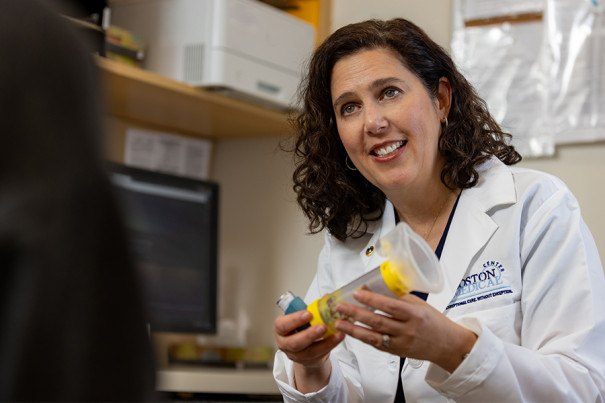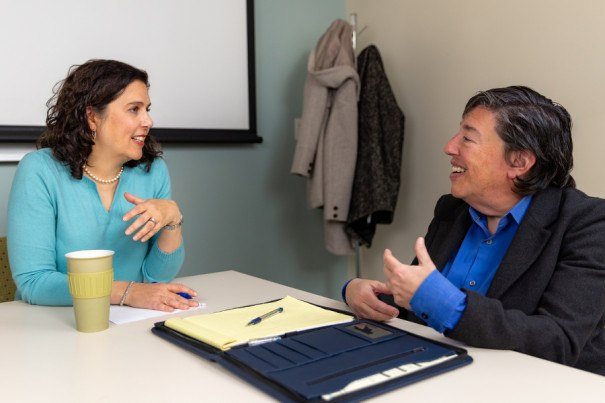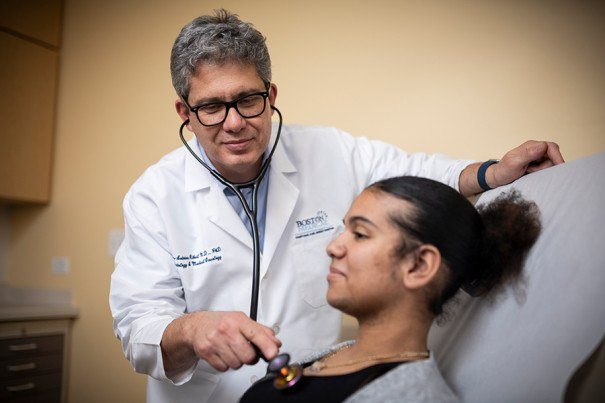Boston Medical Center’s Premier Sickle Cell Disease Care Lays Foundation for Delivery of Innovative Gene Therapy Treatment

Labeled an orphan disease in the U.S., sickle cell disease (SCD) has historically been understudied and underfunded. As a result, effective therapeutics have lagged. Only one medication existed on the market until 2017, and still only four exist today. In fact, the average life expectancy of a person with SCD has barely changed in 40 years. Now, however, SCD care is having a moment in the spotlight.
In December, the FDA approved the first gene therapies for SCD, which is monumental in treating the debilitating disease. But among a primarily Black American patient base that has been misunderstood and stigmatized by the medical system, a foundation of trust is vital for treatment.
An internationally known hematologist on the front lines of gene therapy research for red blood cell disorders, Dr. Jean-Antoine Ribeil, understands how important it is for SCD patients to trust their care teams. It’s why he chose to take his pioneering work to Boston Medical Center (BMC), calling the hospital a “historic place” for advanced clinical care and building trust with its SCD patient community.
“You can invent a rocket to go to the moon, but if nobody wants to go in the rocket, you can bring nobody to the moon,” says Ribeil, who joined BMC in 2021. “That’s the same thing with gene therapy. You need to have all the structures and empathetic teams that really help the patients to get to this place.”
One such structure is BMC’s Center of Excellence in Sickle Cell Disease, led by director Dr. Elizabeth Klings. It’s recognized worldwide and is the largest center of its kind in New England, serving approximately 600 patients, and saving lives every day.

Sickle cell disease in the United States
SCD is a chronic genetic blood disorder that causes red blood cells to become rigid, morphing into a “sickle” shape and clumping together, blocking and damaging blood vessels throughout the body.
How SCD presents for each individual can be highly variable. Pain, often excruciating, is common. Also common are lung problems, including pulmonary hypertension and acute chest syndrome, which can be fatal. Strokes are also common, even among young children, as well as other debilitating diseases such as joint disease, infections, kidney disease, and sleep disorders.
The bottom line: SCD can overtake a person’s life.
“Our patients can never escape having sickle cell disease,” Klings says. “There’s always something that’s going on that’s sickle cell disease–related.”
At first glance, the disease is rare: It affects just 100,000 Americans. But SCD occurs among about one of every 365 births of Americans of African descent — by contrast, it occurs in one in 16,300 Hispanic American births. Moreover, because people with SCD most commonly present to emergency departments with pain crises, Klings says they can be dismissed as drug-seeking given the more top-of-mind opioid crisis emergency department staff have come to anticipate. Black Americans with SCD then face the intersecting stigmas of institutional racism and seeking help for pain, particularly when they move into adulthood.

BMC revolutionizes sickle cell disease care
Klings has been working in the sickle cell field for more than 25 years, and when she became the director of BMC’s Center of Excellence in Sickle Cell Disease in 2015, she had a care revolution on her mind.
“My primary goal was to revolutionize care of sickle cell disease, particularly for our adults,” Klings says. “I felt like we needed to do things differently and really shake up the system.”
Unlike most other places that treat SCD, BMC focuses on care that spans a patient’s lifetime. The Center has a pediatric and adult clinic, linked by a transitional care clinic. There’s connectivity between the inpatient and outpatient programs with the Emergency Department — a space where Klings says many other SCD centers fall short. It also takes “multidisciplinary” from a buzzword to a reality. Visits are led by hematologists but also include expert care from pulmonologists, nephrologists, psychologists, nurse practitioners, social workers, and patient navigators.
Moreover, SCD patients often identify their hematologist as their primary care provider (PCP), but Klings — who is a pulmonologist — built a system for patients to have a true PCP in the Center. That way, patients don’t miss out on crucial basic care elements, such as regular screenings and vaccinations.
“This is a program that does not exist elsewhere in this country,” Klings says.
Beyond PCPs, Klings and her teams have ensured that everyone at BMC understands their patients with SCD. “I really emphasize that we are going to talk about sickle cell disease here at BMC,” she says. “Even if you don’t treat people with sickle cell disease, you’re still going to hear about it. It’s part of the lexicon here, and I will not allow it to slip out of the lexicon.”
Treating sickle cell as a lifespan disease
Pediatric pulmonologist Dr. Robyn Cohen came to work at BMC 12 years ago, largely because of Dr. Klings.
“If you’ve been in the sickle cell space for five years like I had, you know who Liz Klings is,” Cohen remembers. “Most papers I read about pulmonary issues and adults with sickle cell disease, she had written them. I’d seen her at the podium at national meetings about sickle cell disease. I was really excited to meet her and the possibility of working with her.”
Along with the rest of the team, Klings and Cohen have dedicated themselves to the three pillars of the Center: clinical care, research, and education.
In clinical care, the Center’s pediatric program is led by pediatric hematologist Dr. Amy Sobota, who leverages an electronic patient registry to provide systematic, evidence-based care. Sobota’s partner, Dr. Caitlin Neri, directs a multidisciplinary pain management program that uses a variety of therapies, including acupuncture, aromatherapy, and mental health counseling, to complement traditional approaches to treating SCD pain.
Historically, SCD has been seen only as a pediatric disease, and adult patients suffer from a lack of care coordination and experienced providers. BMC is unique in that it ensures a smooth transition from its pediatric to adult SCD care, so no one falls through the cracks.
As difficult as it is for Cohen to see her patients move to adult care, she has full confidence in the handoff.
“I have a patient who is in college on a full scholarship — she is crushing it, and she has severe sickle cell disease and severe asthma. I’m so proud of her,” Cohen says. “It’s hard for me to hand my patients off to providers of adult care because their lives are starting, and I don’t want to miss it. But I’m able to tell them, ‘You’re going to be cared for by a national leader in sickle cell disease. You’re going to be just fine.’”
In research, the Center is at the forefront of innovation. For instance, Klings and Cohen introduced BiPAP, a type of noninvasive ventilation commonly used for sleep apnea, to prevent acute chest syndrome for patients with SCD — a novel treatment. The Center also introduced a biobank, a collection of biospecimens they hope will illuminate the biomarkers of SCD and guide novel treatments.
And education? It starts at BMC but extends well beyond the walls of one hospital.
Klings helped launch the first advanced fellowship specializing in SCD — one of only two in the U.S. for adults — to address the scarcity of qualified physicians in the workforce. Klings and Cohen have partnered with the American Thoracic Society’s initiatives to raise awareness about SCD among pulmonologists, and Klings sits on numerous national and international committees dedicated to SCD.
“We’re not just caring for people here in our Center,” Klings says, “but we are also trying to change the national conversation around sickle cell disease in protocols and logistical procedures, but also in the perception of the disease overall.”

Gene therapy is here, and BMC is ready
BMC’s Center is the bedrock on which new advancements in SCD can grow.
For a cohort of patients who have long known that their disease is misunderstood, underfunded, and stigmatized, gene therapy is historic. Cloret Carl, in her 70s, is one of Klings’ longtime SCD patients, and she credits the “unsung heroes” that got us here.
“It was people like Dr. Klings and the physicians and researchers that I’ve known at BMC over the years that made the difference. They got us to where we are now, where there are a number of breakthroughs and treatments on the horizon,” Cloret says. “They didn’t give up when it wasn’t popular, when sickle cell disease wasn’t something everybody was talking about.”
Alongside FDA approvals, BMC announced it would offer the first-ever gene therapies for SCD, the only hospital in New England to do so for adults. Eligible patients will have their stem cells extracted, edited to correct or transform, and re-transfused. The approximate six-month process that includes inpatient stays can be rigorous — with screenings, transfusion periods, and a four-day period of chemotherapy — but for many patients who live daily with often debilitating effects of SCD, those six months are a health investment they’d be willing to make.
When Ribeil talks about his patients who could benefit from gene therapy, and the possibilities it could open for eligible people, he tears up. He talks about patients who are admitted almost every other day, who live with agonizing pain and difficulty breathing. He tells them, “You deserve your life. You deserve more.”
Ribeil mentions a specific patient’s father who left his home and successful business to move to France to become a taxi driver just so she could have access to care.
“She was so sick, I believe she would have died by this point. But we treated her — and you know how patients with sickle cell disease often can’t handle altitude because of the oxygen decrease? Two years after the transplant, she gave us the news that she went skiing and did the sauna on the same day,” Ribeil says. “Dreams do come true.”
But it’s not without hurdles — including strict eligibility requirements. Ribeil doesn’t dispute this, but he hopes we are only at the beginning of the discussion. As a man of science, he says the evolution of care doesn’t stop now.
“We’re working on access for U.S. patients and patients everywhere,” Ribeil says. “That’s what I love about BMC: We have built a super motivated village effort here. We are, and are going to be, an example for the care of sickle cell disease patients.”

To learn more about BMC’s Center of Excellence in Sickle Cell Disease, visit here.
This is a paid partnership between Boston Medical Center and Boston Magazine


